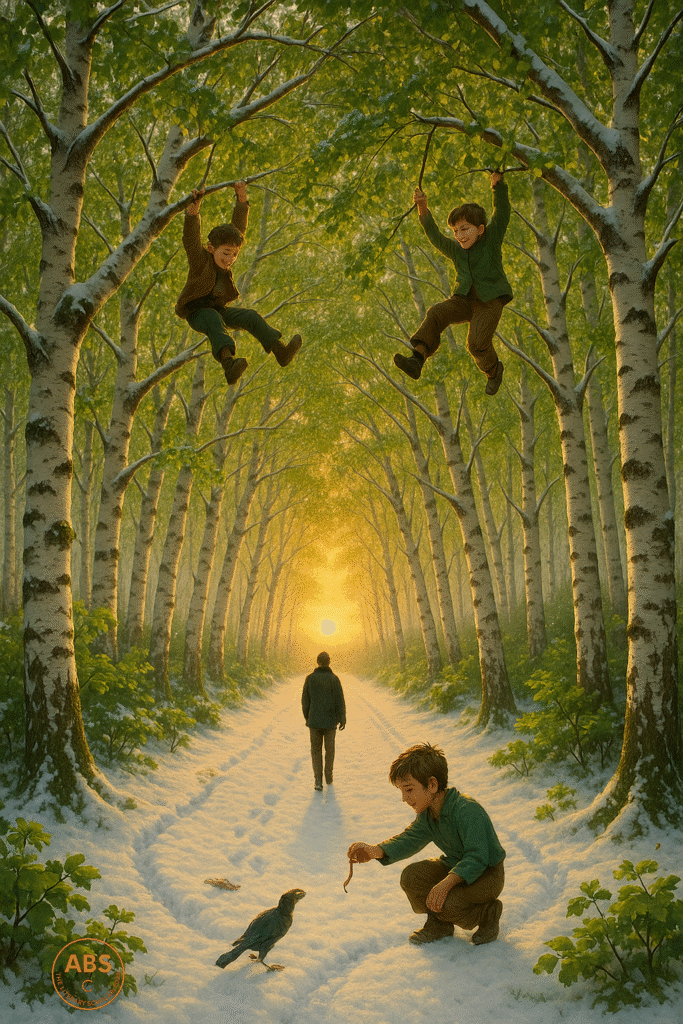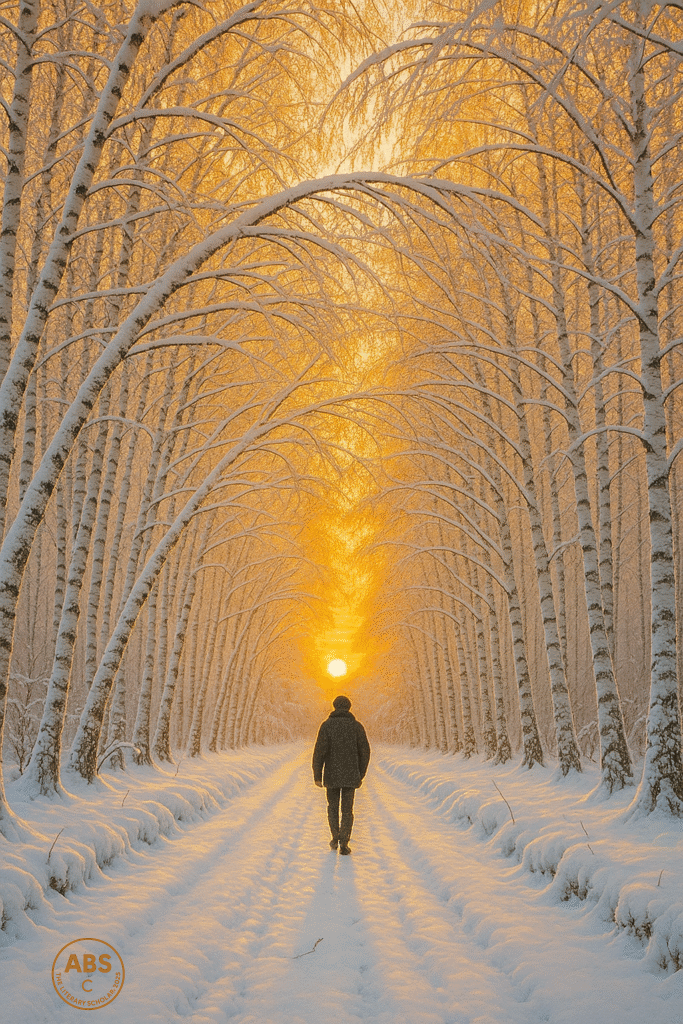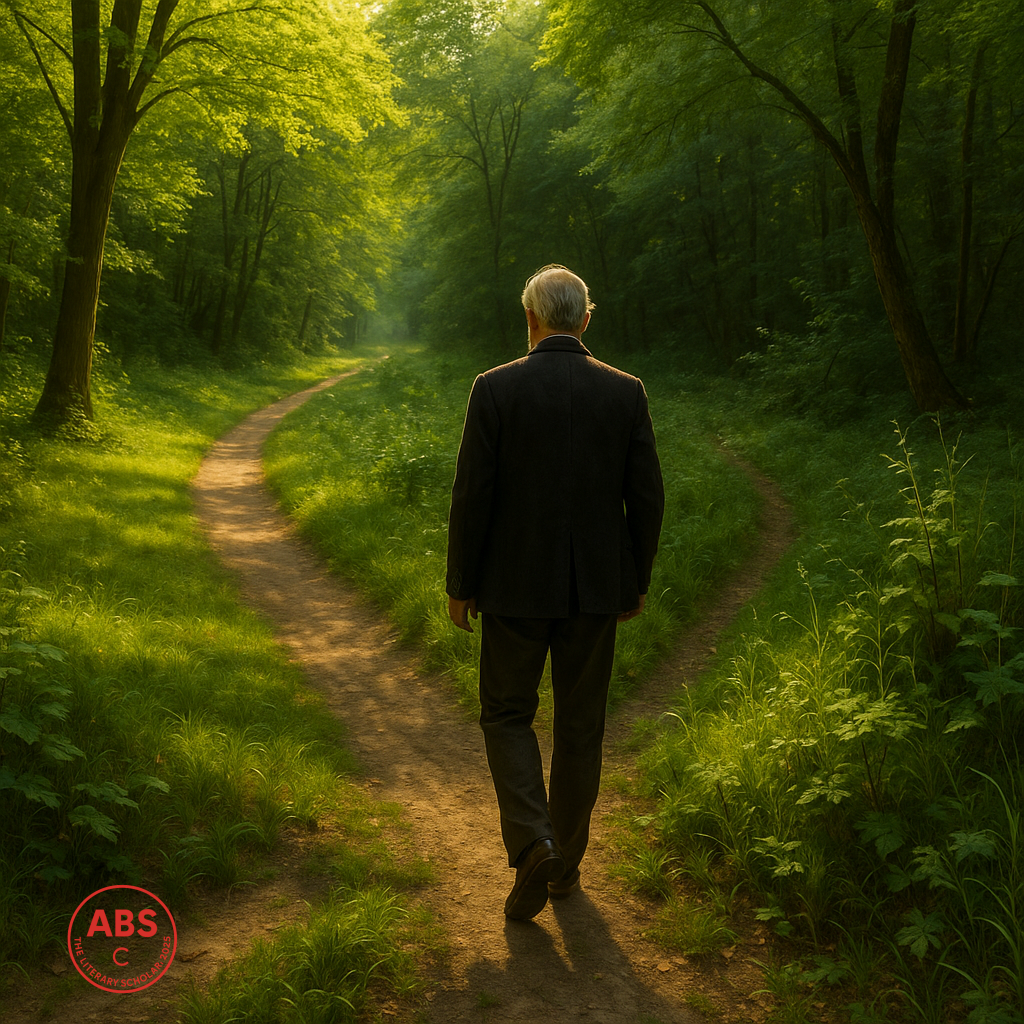Or, The Poet Who Made Nature Look Gorgeous and Emotionally Threatening at the Same Time
By ABS, the Literary Scholar, who believes Robert Frost didn’t just win four Pulitzer Prizes—he quietly collected them like frostbitten warnings, proving that a poet could turn snowy woods and stone walls into lifelong existential crises.
Robert Frost is the literary equivalent of a quiet winter storm—subtle, poetic, beautiful… and absolutely going to mess with your emotional balance by the third stanza. He’s that rare American poet who could write about snow and make you cry, write about walls and make you argue with your neighbor, and write about roads and make you question your entire life strategy.
Born in 1874 in San Francisco (yes, Frost started West Coast), he eventually made his name among the stone fences and snowy woods of New England, where he turned simple landscapes into existential battlefields. Don’t be fooled by the charming imagery—Frost wasn’t offering you pastoral peace. He was hiding life’s most brutal questions behind birch trees and cow paths.
Let’s begin with the poem that launched a thousand misinterpretations:
“The Road Not Taken”—the anthem of decision-making, independence, and ironic misreading. Everyone quotes it as a celebration of bold choices. But Frost? Frost was smirking the whole time.
He literally tells you the two roads were “really about the same,” then says, with a raised poetic eyebrow, that someday he’ll tell people he took the one “less traveled by.”
Translation? You’ll justify your choices later—probably with poetry.
It’s not inspiration. It’s existential hindsight dressed in golden leaves.
Or take “Stopping by Woods on a Snowy Evening”—a poem so still, so lovely, so whispering… and then WHAM:
“And miles to go before I sleep,
And miles to go before I sleep.”
Double-line repetition: the poetic equivalent of staring into your own exhaustion. It’s about beauty, yes—but also duty, weariness, longing, and maybe mortality tucked gently into a sleigh ride.
He could look at a wall and give you “Mending Wall,” where neighbors come together every year to rebuild a stone fence. Frost questions the whole ritual: “Something there is that doesn’t love a wall…”
But his neighbor replies with a suspiciously inherited slogan: “Good fences make good neighbors.”
And there it is—Frost’s America: caught between independence and insulation, friendliness and fear, building connections while simultaneously stacking stones between them.
Or consider “Birches,” where he watches the way ice bends a tree, and for a while pretends it’s just a boy swinging carefree. But then—twist—it’s not nostalgia. It’s longing. It’s “getting away from earth awhile / And then coming back to it and beginning over.”
Frost makes a tree branch feel like a full-blown therapy session.
He wasn’t modernist in the T.S. Eliot way—no fragmented cities or mythic footnotes. Frost was sneaky modern. He used old forms and simple words but laced them with psychological traps and emotional booby traps. You’d think you were reading a cozy pastoral and suddenly find yourself knee-deep in metaphysical dread.
He loved rhyme and meter, not out of stubbornness, but because it let him control the chaos. He once said writing free verse was like playing tennis with the net down. Frost liked a challenge. He preferred to wrestle with life while holding onto structure—because someone in the poem had to stay calm.
And the awards? Four Pulitzers. Count them. Four. One for each season, probably. He read at Kennedy’s inauguration and almost blew away in the wind while doing it, like the poetic embodiment of America’s intellectual conscience trying to stay on script.
Yet, behind the public praise was a life riddled with grief—his children died young, his wife passed away, and he battled depression most of his life. He wasn’t writing peace. He was writing despite the absence of it.
His genius was in his balance: the icy calm and the smolder underneath. He could write about a farmhouse and make it a universe. About snow and make it spiritual. About a crow and suddenly you’re contemplating forgiveness.
Frost’s poetry doesn’t need explanation.
It needs attention.
It doesn’t try to dazzle you.
It tries to follow you home and tap on your shoulder quietly five hours later.
ABS, The Literary Scholar, after reading Acquainted with the Night aloud to the wind and promptly checking if any neighbors saw, closed the volume softly and whispered:
“Frost doesn’t warm you.
He chills you just enough to make you feel something real.”
Then, while watching someone quote “The Road Not Taken” on social media beneath a hiking selfie, ABS muttered:
“He didn’t say it made the difference.
He said you’ll say it did.”


Signed,
ABS
The Literary Scholar
Who now walks through woods suspiciously slow and questions every fork in the road—even in supermarket aisles.


Share this post / Spread the witty word / Let the echo wander / Bookmark the brilliance
